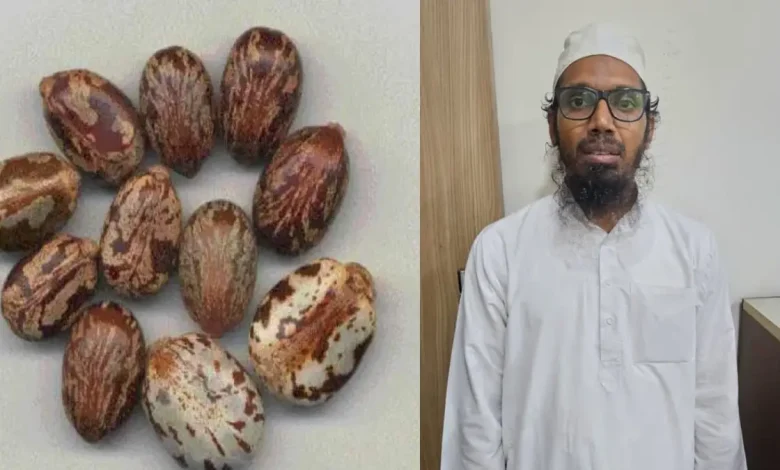
Ahmedabad: In a major anti-terror operation, Gujarat Anti-Terrorism Squad (ATS) busted a plot involving the production of ricin a highly toxic chemical classified as a potential biological weapon. Three individuals were arrested on Monday, November 10, 2025, for allegedly planning large-scale terror attacks using the deadly substance.
ATS identified the main accused as Dr. Ahmed Mohiuddin Syed from Hyderabad, who allegedly turned his residence into a makeshift laboratory to produce ricin. The other two suspects, Azad Suleman Sheikh from Uttar Pradesh and Mohammad Suhail Salim Khan from Ahmedabad, were detained for their involvement. Officials revealed that the trio had planned to contaminate public water supplies and temple prasad in cities including Delhi, Ahmedabad, and Lucknow.
What Is Ricin and Why It Is Deadly
Ricin is extracted from the waste residue of castor beans commonly used to make castor oil. Discovered in 1888 by German scientist Peter Hermann Stillmark, the toxin blocks protein synthesis within cells, leading to rapid cell death and organ failure. Even trace amounts can prove fatal.
Symptoms of Ricin Poisoning
According to a medical analysis report cited by The Print, ricin exposure through inhalation causes immediate irritation of the airways and lungs. Symptoms can develop within hours and include fever, chest tightness, nausea, cough, and breathing difficulty.
As poisoning progresses, victims may develop pulmonary edema (fluid in the lungs), dangerously low blood pressure, and respiratory failure. When ingested, ricin causes severe vomiting and bloody diarrhoea, leading to dehydration and organ failure if untreated. Other severe outcomes include hallucinations, seizures, and kidney or liver collapse.
There is currently no antidote or vaccine for ricin poisoning. Medical intervention can only provide symptomatic relief and support the body’s recovery, though survival largely depends on the exposure level and speed of treatment.
Ricin’s Grim History in Global Terror
Ricin has been used in several high-profile assassination attempts and terror plots worldwide. In 1978, Bulgarian dissident Georgi Markov was famously killed in London after being injected with ricin via a modified umbrella an operation believed to be backed by the Soviet KGB.
Three years later, CIA agent Boris Korczak survived a similar attack. In 2014, James Everett Dutschke from Mississippi was convicted and sentenced to 25 years in prison for mailing ricin-laced letters to then–US President Barack Obama and other government officials.
The Gujarat ATS case underscores growing concerns about bio-terrorism and the access of extremist groups to lethal chemical agents capable of causing mass harm.




